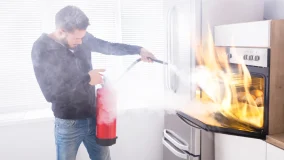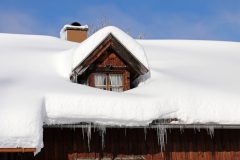The Leading Causes of House Fires and How To Stay Prepared
Fire is one of the leading causes of property damage, injury and death in the United States. In this article, we’ve outlined some of the main sources of home fires so that you can be more aware and better prepared to protect your loved ones and home. We’ve also provided tips on what to do if a fire does occur in your home. Finally, we answer the question: are fires covered by home insurance? The quick answer is yes, but it depends on your policy.
It’s important to understand the primary causes of house fires and the key things you can do to lower your chances of being affected by a fire. For example, if you have what is considered a high-risk home (a home with children, pets or if you require an oxygen tank to live), you may want to invest in fire protection systems, smoke detectors and homeowners insurance.
What Causes House Fires?
House fires can be created by any number of things, from faulty wiring to a kitchen stove that was left on. However, some of the most common reasons for house fires are:
Cooking: This is the leading cause of house fires, accounting for 43% of all home fires. The best way to prevent cooking fires is to always stay in the kitchen when you’re cooking, and keep an eye on what you’re preparing. Never leave food unattended on the stove.
Candles: Candles are a leading source of fire deaths in the United States. Make sure to always keep candles away from flammable objects, and never leave candles burning unattended.
Clothes Dryers: Clothes dryers are the cause of 27% of house fires in the United States. Never overload your clothes dryer, and always keep the lint trap clean so that flammable material will not build up.
Smoking: 30% of fire deaths are contributed to cigarettes, cigars or other smoking materials. Never smoke in bed, and make sure that your cigarette is completely out before you throw it away.
Heating Equipment: Space heaters are the most common factor of house fires during the winter months. Always keep space heaters at least three feet away from flammable objects, and never leave them on when you’re not at home.
What You Can Do to Prevent House Fires
One of the best ways to protect your home from fire is to install and maintain smoke detectors. Smoke detectors can provide an early warning signal of a fire in your home, which can give you enough time to evacuate safely. In addition, you should always have a fire extinguisher on hand in case of a fire emergency. If you have a working fire detector, a fire extinguisher can help you to put out the fire and save your home from further damage.
Even if you already have smoke detectors installed in your home, another effective detection system is what’s known as a monitored home security system. A monitored home security system comes with a number of features that can help you to protect your home, including what’s known as a fire panel. A fire panel provides an early warning into what may be happening in your house, even if no one is there or no smoke detectors are activated.
Most importantly, make sure that you are aware of what could lead to an accidental house fire so that you can do what you can to prevent them. Even if smoke detectors are installed throughout your home, what may be more important is what’s inside your home.
What To Do If a Fire Occurs Inside My Home
If a fire does occur in your home, make sure that you evacuate the premises immediately. Do not try to fight the fire yourself — leave that to the professionals. Make sure that you do not return to your home until it has been determined by the fire department that it is safe to do so.
One of the most important things to remember is that fires can spread quickly and often without warning. That’s why it’s important to have a plan in place for what you will do if a fire does occur in your home. Have a meeting place outside of your home where everyone in your family will meet in case of an emergency. Make sure that everyone knows how to get out of the house quickly and safely.
If you have pets, make sure that they are included in your family meeting plan. If you have any concerns about what might happen to your pets, or what will happen if they get loose and run away, it may be best to crate train them and keep them in a safe place while the fire department is working on putting out the flames.
Does Homeowners Insurance Cover House Fires?
Homeowners insurance is a preventative form of insurance that protects your home and belongings against forms of damage, disaster or liability. So, what does home insurance cover? Most policies will cover damages caused by fires, the costs of repairing or rebuilding your home if it’s damaged by a fire, as well as the costs of replacing your possessions. However, some policies may not cover certain types of fire damage, such as damage caused by a fire that was started deliberately. Be sure to read through your policy carefully or contact your insurance agent at Acceptance Insurance for more information.
Liability insurance protects you from injuries people may sustain on your property, and is worth considering if you have children or pets who are known to engage in unsafe activities that could cause a fire. For example, if your child was playing with matches and caused a fire at home, your typical homeowners insurance may not cover what has happened.
Protect Your Family and Home from House Fires
At Acceptance Insurance, we believe that insurance should be easy and affordable. That’s why our agents work with you to help you create a custom plan — one which has all the coverage your family needs without any unnecessary headaches or cost surprises later on!Get a free, no hassle quote today.
Common Questions Asked About Leading Causes of House Fires
What is the #1 Cause of House Fires?
The #1 cause of house fires is cooking. In fact, cooking fires account for almost half of all home fires. The main thing to remember when cooking is to stay alert and never leave food unattended.
What Appliance Causes the Most House Fires?
The majority of house fires begin in the kitchen. Cooking and home heating appliances (e.g. oven, stove, or toaster) cause the most fires each year, followed by electrical distribution or lighting equipment, and then smoking materials, such as cigarettes, cigars, pipes, and vape pens.
What Kind of House Fire Coverage Should I Get?
There are several different types of house fire insurance policies available, and each one has its own benefits and drawbacks. The best policy for you will depend on your individual needs and situation. Consider the amount of coverage you need, whether the policy covers both structure and contents, deductible amount and type of fire protection system you have in your home.



